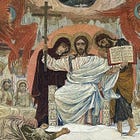How is Christ's Kingdom 'not of this world'?
Christ stands before Pilate not as a rival to Caesar, but as the King of all truth and grace.

Christ stands before Pilate not as a rival to Caesar, but as the King of all truth and grace.
Editor’s Notes
In this chapter, Fr Coleridge tells us…
How Christ affirms His Kingship while rejecting all worldly ambition or violence.
That Pilate is forced to confront a Kingship rooted not in Caesar’s world but in truth.
Why Christ’s calm confession marks the coronation of a Kingdom not made by man.
He shows us that even before His judge, Christ declares Himself King – of a Kingdom ‘not of this world.’
For more context, see Part I.
See also:
Pilate and Christ the King
The Passage of Our Lord to the Father
Chapter VIII: Pilate
St. Matt. xxvii. 11-25; St. Mark xv. 2-14; St. Luke xxiii. 2-17; St. John xviii. 28-40; Story of the Gospels, §§ 165-167.
Burns and Oates, London 1892.
(Read at Holy Mass on Christ the King)
Why did the priests tell Pilate that Jesus claimed to be King?
Why did Pilate keep asking Christ whether he was really a King?
Their charge before Pilate
After Pilate’s first objection, as we learn from St. Luke, the priests produced their specific charges against our Lord, in order to meet the question put by the Governor.
‘And they began to accuse Him, saying, We have found this Man perverting our nation, and forbidding to give tribute to Cæsar, saying that He is Christ the King.’
This was a definite charge, but it had nothing at all to do with the sentence of the Council, by which our Lord had been declared to be guilty of death. But it explains perfectly the next words of Pilate, which the three first Evangelists all repeat.
‘And Pilate asked Him, Art Thou the King of the Jews? But He answering saith to him, Thou sayest it.’
The incident is probably shortened by St. John in his account, for the words which passed between our Lord and Pilate were not said in the presence of the Jews, who would not enter the Prætorium. St. John tells us that Pilate, leaving them, ‘went into the hall again, and calling Jesus, said to Him, Art Thou the King of the Jews?’
This question showed that the charge now made against our Lord was an entirely new one, and had no connection with the charge which alone, or as the principal thing, was in the minds of the judges who had condemned Him as guilty of death.
It was on what the priests said to him that the question of Pilate to our Lord was based—‘Art Thou the King of the Jews?’—which our Lord at once answered simply in the affirmative. As the answer of our Lord made Pilate interrogate Him yet further, St. John takes the occasion of giving the conversation with rather more fullness of detail than he is wont to employ, and in this way, in this passage and others, we have some extremely precious words of our Saviour preserved to us.
We conceive that when St. Paul in his First Epistle to St. Timothy speaks of our Lord as having witnessed a good confession before Pontius Pilate, the passage to which he refers is that now before us.
‘Art thou the King of the Jews?’
Pilate began the conversation by repeating his former question, which he may have put to our Lord in the presence of the accusers. ‘Art Thou the King of the Jews?’
Father Coleridge Reader is a labour of love. But curating, cleaning up and publishing these texts takes real work.
To keep this project going, and to make more of this treasury available, we rely on reader support. Some posts are reserved for members to sustain this mission.
We’re trying to keep something precious alive.
If you’ve benefited, consider joining us as a subscriber. It makes a real difference.


